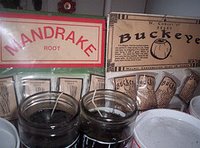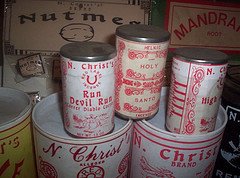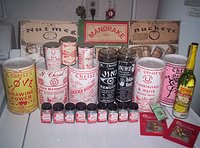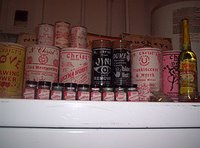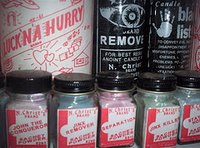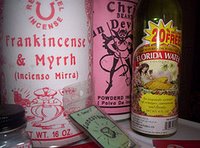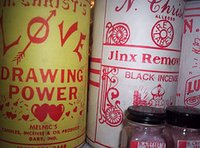Copyright Leslie Jones McCloud 2005
African-American lawyer and publisher, Robert Sengstacke Abbott
(1868-1940) founded the Chicago Defender on May 6, 1905.
He was born to former slaves Thomas and Flora Abbott in a cabin,
in Frederica, St. Simons Island, Georgia according to a
Philadelphia-based Mount Union College Web site on Abbott.
Soon Abbott's father died of tuberculosis and Flora remarried to
John Hermann Henry Sengstacke and it is here the legacy began.
Abbott's stepfather John, was a hardworking, well educated man.
John’s father, also John Hermann Henry Sengstacke, was a German
sea captain from Brehman, Germany who settled in Savannah Georgia
during the late 1830s, according to Joslyn DiPasalegne, Vice
President of Event Marketing, Sengstacke family historian and
Abbott’s great-niece.
"One day while surveying his new home, he went to the factors
walk--an area where warehouses and factories were in town. The
(sea captain) stared in horror. He had never seen a slave auction
before," she said.
He bought Tama to keep her from being humiliated. Shortly after
her purchase, he married her and they settled in Savannah. He
started a dry goods store in an area near factor's walk. They had
two children; John, Abbott’s stepfather and John's sister Mary
Flaurance.
Tama died shortly after giving birth to her daughter.
The German sea captain, not wanting his children to become slaves
if anything were to happen to him, sent them to Germany to be
raised by his sister, DiPasalegne said.
"The Civil War kept him from returning to see his children before
he died. After his death Abbott’s stepfather, John came to settle
the sea captain's estate. That is where he met Flora, Abbott’s
mother, who was a recent widow. Her husband Thomas, Abbott's
natural father, died of tuberculosis shortly after Abbott was
born. She was fighting her in-laws over the rights to her son,"
she said.
John Sengstacke married Flora and together they raised seven other
children.
Abbott’s stepfather, John became a Congregationalist minister, and
operated a school for black children said the Web site, African
American Registry.
He also operated the Woodville Times newspaper in their home state
of Georgia--the predecessor to the Chicago Defender those in the
Sengstacke family believe, DiPasalegne said.
Abbott was sent Claflin University and then studied the printing
trade at Hampton Institute from 1892 to 1896.
While there, he made a life changing discovery on a trip to
Chicago, singing with the Hampton choir, according to a film by
Stanley Nelson, The Black Press: Soldiers Without Swords.
James Grossman, who is in the film, said Fredrick Douglass at the
age of 75 delivered a speech at the Columbian Exposition but was
heckled by a crowd of rowdy whites.
He made his speech anyway about how blacks serve great a purpose
in the world and Abbott was there watching and learning.
He said that Abbott was in Chicago for the first time and Ida B.
Wells had recently emerged as a major leader and voice within the
African American community. And all three of these people were
journalists.
Abbott went on to receive a law degree from Kent College of Law,
Chicago in 1898, but because of race prejudice in the United
States, he was unable to practice, in spite of attempts to
establish law offices in Gary, Indiana, Topeka, Kansas, and
Chicago, Illinois.
So he returned to his roots. His stepfather John, had a print shop
of his own.
Christopher Reed in the film, The Black Press: Soldiers without
Swords, said he believed Abbott's presence at the fair led him to
believe a change in American values could come through the
newspaper.
"Abbott invested the 25 cents he had in his pocket, his good
name and then borrowed money from a friend," DiPasalegne said. He
set his printing equipment in his landlady's dining room with a
folding card table and used a kitchen chair as his office.
On May 5, 1905, he started the Chicago Defender.
He sold three hundred copies of the four-page booklet by going
door to door, visiting every barber shop, poolroom, drugstore, and
church on the South Side of Chicago, writes Roi Ottley, author of
The Lonely Warrior: The Life and Times of Robert S. Abbott.
Local news was the thrust of the Chicago Defender, as it is today.
Abbott started his earliest reporting by gathering tidbits around
his neighborhood.
His newspaper was penned "The World's Greatest Weekly" and
eventually made Abbott one of the first black self-made
millionaires through publishing. He worked for fifteen years to
make the newspaper successful, the African American Registry Web
site said.
He also immersed himself into the world of the Black Press.
Black Chicago got to see their world chronicled in print.
"Our news and neighborhoods were ignored. We didn't exist in the
other papers. We were neither born, we didn't get married, we
didn't die, we didn't fight in any wars, we never participated in
anything of a scientific achievement. We were truly invisible
unless we committed a crime. But in the Black Press, the Negro
press, we did get married. They showed us our babies being born.
They showed us graduating. They showed our PhDs,” Vernon Jarrett
said, in the film, Black Press: Soldiers Without Swords.
More than 500,000 Blacks migrated from the south to the north with
more than 50,000 settling in Chicago.
Abbott used The Defender to encourage migration to the North. He
would post job
notices and writings about better conditions in the North. He also
used red headlines to
speak his mind on each lynching that happened in the South in
hopes more Southern blacks
would relocate to the North.
He sent the Defender into the South. There, the Defender had a potential
black audience
nearly 200 times larger than
in Chicago, an audience that was hungry to hear what Abbott had to
say, film maker, Stanley Nelson said.
James Grossman of Nelson's film said the Chicago Defender was
blatant with the truth.
The Defender would say things like, "When the white fiends
come to the door, shoot them down. When the mob comes, take at
least one with you." Those
were things that if you were a black Southern newspaper, if you
were a newspaper editor in
Birmingham, Alabama, you can't say that because your newspaper's
going to get torched or
you're going to get run out of town.”
The nick name of public defender, still sticks in the minds
of those in the community who need help today.
Abbott’s editorial creed was to fight against "segregation,
discrimination and
disenfranchisement.
The Defender reached national prominence during World War I, when
the paper's banner headline for January 6, 1917, read
"Millions to Leave South." The Defender became the bible of many
seeking "The Promised
Land."
Abbott used the full resources of the paper -- articles,
editorials, cartoons, poems, and
even songs-- in a campaign to urge the Defender's readers to come
North. The paper even
printed train schedules, one-way to Chicago, Nelson said in his
film.
Abbott advertised Chicago so effectively that even migrants
heading for other
northern cities sought information and assistance from the pages
of the "Worlds Greatest
Weekly."
The Chicago Defender was a remarkably successful in encouraging
blacks to migrate from the
South to Chicago, often listing names of churches and other
organizations to whom they
could write for help, such as the Bethlehem Baptist Association in
Chicago, Illinois,
according to information from the Library of Congress.
Still, White southerners did not take the migration seriously.
“When the great migration really first began in the fall of 1916,
white
Southerners were sure that when blacks
went North, they would get cold. and they'd come back. That didn't
happen. Landlords and other employers began to realize that
their workers were
leaving so they began to try to stop people from leaving, which
meant trying to confiscate
The Chicago Defender. They would even have the police go up onto
railroad platforms and
arrest people for vagrancy,“ James Grossman said.
Nelson said with more than ten thousand black people leaving each
month, the South's economy
suffered and its leaders grew desperate. Some towns, ignoring the
Constitution, even banned
the sale of black papers to try to stem the tide of the migration.
In Somerville, Tennessee
a petition ordered that "no colored newspapers be circulated" and
that "every darkie must
read the local white paper." Abbott, asked for help from
the one group of African Americans who traveled freely through the
South--sleeping car porters.
“He hands them bundles of his newspapers, which they hide in the
train, and as these trains roll through the South,
instead of being put off at the stations like they used to be,
which are in the town limits
or the city limits, these porters would step out between cars or
at the back of the train,
toss 'em out in the countryside and suddenly all these Southern
cities found they couldn't
stop the black newspapers, no matter what they did, “ Patrick
Washburn said in Nelson’s film.
Thomas Picou, Sengstacke in-law and Chairman of Real Times, Inc. parent
company of the
Chicago Defender, said the train's path wound through New Orleans making
stops in Jackson
Mississippi and Memphis, Tennessee then on to Chicago.
"It was called the chicken bone express because blacks
brought boxes of fried chicken with them. The train's dining car
was segregated," Picou said.
He said the people from the south also traveled through Indianapolis,
Detroit Michigan Cleveland Ohio to work in the steel mills,
automobile factories and stock yards.
As a result, thousands of prospective migrants got help with the
task of finding housing and employment.
During the years to come, Abbott was simply telling black folks
what to do when they made it north during the great migration.
Abbott, being a self made millionaire, cared about the social
graces of the new migrants and wanted them to fit into their community.
"Abbott himself was formal and reserved, writes Nelson.
“ He was 50 years old before he married. He
would allow neither his first nor his second wife to address him
as other than "Mr.
Abbott". He did not drink and avoided social activities. What he
enjoyed was the trappings
of wealth -- the gold- headed cane, the grand tours of Europe, and
even though he did not
drive, the Dusenberg convertible and Rolls-Royce limousine. Like
many in the black middle
class, Abbott was enamored of the social graces and attempted to
use the paper to teach
them to his readers. He even published a list of rules for
migrant's behavior. Such as:
"Don't promenade on the boulevards in your hog- killin' clothes."
"Don't clean your fingernails and pick your nose on the street."
"Don't flirt with the grocery, especially if your hair is still
chunky and full of bed
lint." " Nelson said.
The Chicago Defender and Mr. Abbott played a major role in
changing the face
the North. Using its pages, Mr. Abbott
was able to influence more than 50,000 African-Americans to leave
southern states and come to Chicago.
But like with all fast change comes conflict. There were riots and
allegations by the Unites States government of sedition during that time.
The Chicago Defender came under fire, starting with World War I.
Abbott was the first target of the intimidation effort on April 13, 1917,
only a week after
the United States entered WWI, according to information from Elliot
Parker of Central
Michigan University on the CataList Reference Web site.
Worried that repressed blacks would refuse to support World War I, the
War Department held
a conference with 31 of the nation's leading black editors in June of
1918.
The gathering was a seminal event in the relationship between the black
press and the U.S.
government in wartime. It led to President Woodrow Wilson making a
public denunciation of
lynching and commuting the sentences of 10 black soldiers who had been
sentenced to death for rioting," Parker wrote.
However, in 1919, race riots exploded across the United States and
hundreds
of people were killed. It became
known as "The Red Summer".
Grossman said a riot broke out during the summer in Chicago, July
of 1919.
In the end, more than 30 people died. Hundreds were injured and
The Chicago Defender ran a box score. At the top of the front page
it would keep track, day-by-day, of how many people on each side
had been killed.
The government's first attempt to solve the black press problem,
which it instituted more than a year before the editors conference,
involved intimidating editors, writes Parker, whose publications it
considered
inflammatory.
Members of the Black Press capitalized on white and black soldiers
fighting each other during both World Wars.
The Chicago Defender went so far as to send a reporter undercover
to a military camp to capture what was going on, Picou said.
During the First World War and the subsequent Red Scare years the
Justice Department and its Bureau of Investigation, the
intelligence branches of the Army and Navy, the State and Post
Office Departments, and other federal agencies engaged in
widespread investigation of anyone deemed politically suspect.
Black Americans were special targets because they were perceived
by some as particularly receptive to the radical ideas.
And, it wasn't a secret.
Theodore Kornweibel Jr., a Professor of
African American History in the Africana Studies Department at San
Diego State University, wrote about it in an article entitled
"The Most Dangerous of All Negro Journals": Federal Efforts to Suppress
the Chicago Defender During World War I."
Abbott, created the "Bud Billiken" picnic in the early 1920s to thank
the children who helped sell his newspapers. The picnic is held in
conjunction with the Bud Billiken Parade, the annual South Side
celebration named for a mythical, squat comic character that serves as a
mascot.
The parade, held in mid-August, honors black children on a route along
Martin Luther King Drive from 39th to 55th Streets. It is the nation's
largest African American parade, drawing thousands of spectators each
year.
The thousands who heeded Abbott's call to move North created new
urban communities and in city after city, other black newspapers
were established to serve them. Nearly 500 black newspapers were
in print by the early 1920s
Government estimates of the Defender's circulation soared tenfold, from
12,000 to 120,000,
between 1916 and 1918.
The government cited Abbott's efforts toward migration during the war and
because the
Defender became available nationwide.
But it wasn't just the circulation of the Defender and other black
newspapers that
concerned the government but the eloquence of the editors and their
ability to sway the
public, in the role of journalist.
The Justice Department issued a report on October, 1919, on the threat to
public order from
what it considered radical publications. The section on the black press,
"Radicalism and
Sedition Among the Negroes as Reflected in Their
Publications," mentioned how articulate many black editors were.
(The citation on the report's reference to the black press:
"Investigation Activities of
the Department of Justice," 66th Congress, 1st Session, Senate
Document XII.)
Other editors under fire included W. E. B.DuBois of the Crisis, J.H.
Murphy of
the Baltimore, Afro-American, J.E. Mitchell of the St. Louis Argus ,
Cyril Briggs
of the, Amsterdam News and A. Philip Randolph and Chandler Owen of the
Messenger.
The group of black editors signed a resolution that asked for black
loyalty towards the
country and a belief that the Germans needed to be defeated. In return,
they asked for
President Woodrow Wilson was asked to create a federal law against
lynching but he
only denounced
it. There were slight improvements for black soldiers and officers
because of the
conference but overall, Parker writes, the conference failed to produce
concrete civil
rights results but it had an important psychological impact on the
editors and the militancy would continue during World War II.
As a result, soldiers' reading was curtailed.
"The Army said, "We don't think this is good. You can't read it."
On a number of bases you had papers that were taken away from
newsboys, black newspapers. You had paper burnings, Patrick
Washburn, who appeared in the film, The Black Press: Soldiers
Without Swords said.
Along with other African American newspapers, the Defender
protested the treatment of African American servicemen fighting in
World War II and urged the integration of the armed forces.
As a result of their protests, the U.S. government threatened to
indict African American publishers for sedition and treason, again.
But Abbott's health was in decline.
His 25th anniversary message to the public outlined what Abbott intended
to do when he started the newspaper.
"Before I started on my life's work--journalism, I was counseled by my
beloved father that a good newspaper was one of the best instruments of
service and one of the strongest weapon ever used in the defense of
race." Abbott said.
Abbott began a new magazine from October 1930 to September 1933
entitled Abbott's Monthly. Later the name was changed to Abbott’s
Weekly and Illustrated News. Inside were stories written by new
writers such as Richard Wright and Chester Himes. Abbott also
accepted submissions from Cook County, Illinois judges, like
Circuit Court Judge Joseph Burke. He wrote a piece called "Divorce,
the Great American Pastime," according to the cover of the
magazine, found on the Galactic Central Publications Web site.
Seven years later, Abbott died at the age of 70.
He died of Bright's disease, an inflammation of the kidneys, on
February 29, 1940.
By then, he had become the father of three newspapers; The Chicago
Defender, The Louisville Defender, and the Michigan Chronicle in Detroit.
However, he did
not have any children, so he left his business with his nephew, John H.
Sengstacke.
And just in time, because by 1942, near the end of World War II, there
were new charges of sedation against the Chicago Defender and John
Sengstacke would find himself following in his uncle's footsteps.
###





